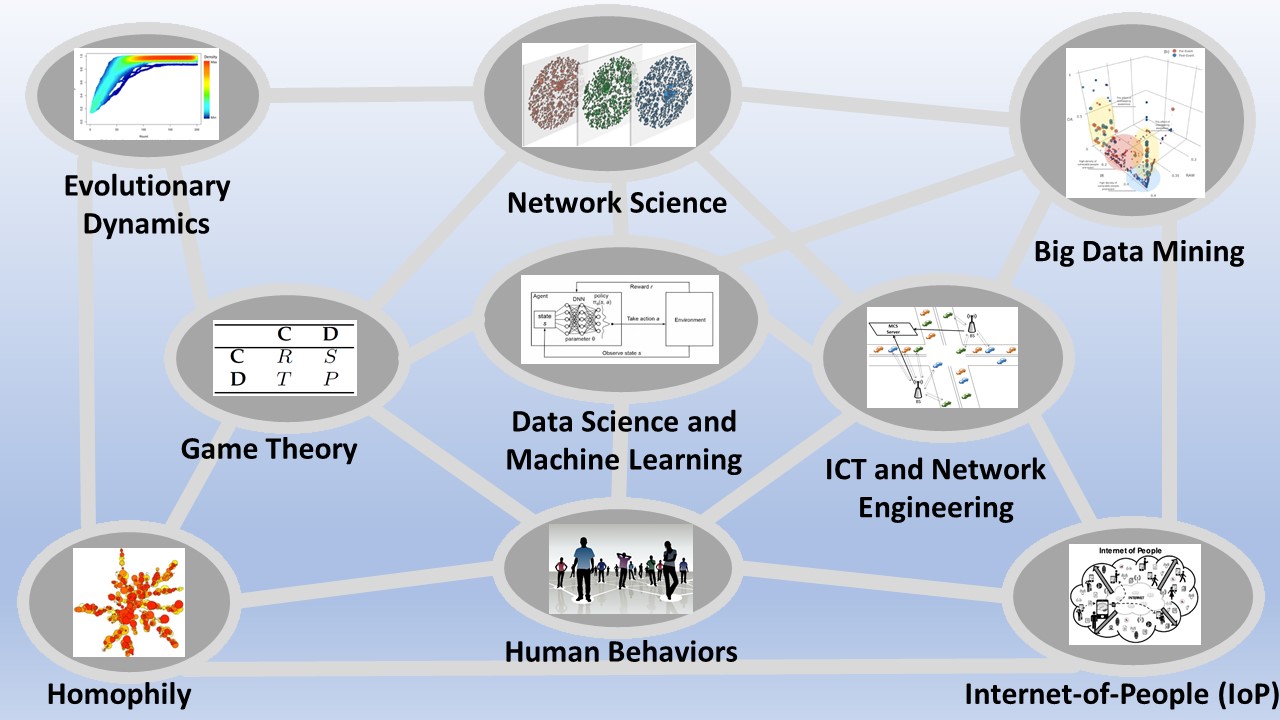
Dr Alessandro Di Stefano
Associate Professor, Teesside University, Middlesbrough, UK
About me
I am an Associate Professor in Computer Science at Teesside University, Middlesbrough, UK, School of Computing, Engineering & Digital Technologies (SCEDT). I take an interdisciplinary approach to research, incorporating engineering and computer science methodologies to address challenges in socio-technological systems. My main research interests lie at the intersection of multi-agent systems, game theory, complex networks, and artificial intelligence (AI), including machine learning (ML), deep learning (DL), and emerging LLM-based agent systems.
By combining game-theoretic modelling with multiplex network representations, my work integrates data and knowledge, reduces system complexity, and enables the analysis of emergent behaviours and social phenomena in complex environments. This allows the design of innovative and beneficial strategies for society. Recently, I have focused on developing methodologies that bridge game theory, network science, and AI, with particular emphasis on multi-agent systems and AI governance frameworks. This integration aims to understand and manage emergent properties in multi-agent AI systems, ensure safe AI behaviour and fairness, and create robust mechanisms for AI agents’ interactions.
I was born in Catania, Sicily, Italy in 1985. I received my BSc (2009) and MSc degrees (2012) in Telecommunications Engineering from the Department of Electrical, Electronic and Computer Engineering (DIEEI) at University of Catania, Italy, and the PhD in Systems Engineering from the same University, in 2015.
After my PhD, I worked as postdoctoral researcher at DIEEI, University of Catania, for almost four years, and then as a research associate and teaching assistant at the Department of Engineering, King’s College London (KCL), London, UK, supervised by Prof. Nishanth Sastry. Then, I worked as a research associate at Computer Laboratory, Department of Computer Science and Technology, University of Cambridge, UK, supervised by Prof. Pietro Liò, with whom I have been collaborating since 2012.
I am an IEEE member (including the IEEE Professional Communication Society and the Technical Committee on Computational Life Sciences), and sit on the Complex Systems Society (CSS) council. I collaborate with several universities all over the world and I regularly serve as a reviewer for various top-tier journals, such as IEEE Transactions on Mobile Computing, Nature Scientific Reports, IEEE Transactions on Communications, and PloS One, and leading international conferences (IJCAI, ECAI, AAMAS, CCS, IJCNN, ICDCN, etc.), where I am part of the Technical Program Committee.
Apart from my passion for research, I love playing football, swimming, and running, which help me recharge, stay focused, and active. I also like reading, listening to music, and travelling, which keep me curious and creatively inspired.
What's New
New!! [December 2025] Our work: “Can LLMs effectively provide game-theoretic-based scenarios for cybersecurity?” published at Frontiers in Computer Science. Check it out at: 10.3389/fcomp.2025.1703586.
New!! [October 2025] Our work: “FAIRGAME: a framework for AI agents bias recognition using game theory” accepted at ECAI 2025!! arXiv:2504.14325. Recognised with the ECAI Outstanding Paper Award!! ECAI 2025 Oustanding Paper Award.
New!! [September 2025] Our work: “Strategic Communication and Language Bias in Multi-Agent LLM Coordination”. Accepted at the 18th International Conference on Multi-disciplinary Trends in Artificial Intelligence (MIWAI 2025). ArXiv preprint: arXiv:2508.00032.
New!! [September 2025] Our work: “Explainable Detection of Suicide Intent in Social Media Using Machine Learning and Transformer Models”. Accepted at the 18th International Conference on Multi-disciplinary Trends in Artificial Intelligence (MIWAI 2025). explainable-detection-of-suicide-intent-in-social-media/51748426.
New!! [July 2025] Our work: “Can Media Act as a Soft Regulator of Safe AI Development? A Game-Theoretical Analaysis.” accepted at ALife 2025!! arxiv:2503.09858
New!! [July 2025] Our work: “Trust AI regulation? Discerning users are vital to build trust and effective AI regulation” published in Applied Mathematics and Computation!! ScienceDirect
New!! [July 2025] Invited speaker talking about “AI for Industry” and podcast guest at Tees Valley Business Summit Tees Valley
New!! [July 2025] Our work: “Vessel Propulsion Power Forecasting Using Variational Mode Decomposition and Convolutional Neural Networks” presented at ICECET 2025!! ICECET 2025
New!! [June 2025] Presented two works “A Multimodal AI Framework for Sustainable Inventory Management and Waste Reduction in the uPVC Fenestration Industry” and “AI-Driven Intelligent Design and Business Intelligence System for Automated Technical Drawings in the Roofing Industry” at DFBI 2025!! DFBI 2025
New!! [April 2025] Our work: “Optimizing text-to-SQL conversion techniques through the integration of intelligent agents and large language models” published in Information Processing & Management!! ScienceDirect
New!! [April 2025] Our work: “Enhancing Construction Design Efficiency: An Approach to Data Extraction with Natural Language Processing for Technical Drawing” published in SASBE 2024!! Springer
New!! [Mar 2025] 2025 AI Governance Modelling Workshop at Teesside University. Two outputs now on arXiv: “Do LLMs trust AI regulation? Emerging behaviour of game-theoretic LLM agents” arxiv:2504.08640 and “Media and responsible AI governance: a game-theoretic and LLM analysis” arxiv:2503.09858
New!! [Jan 2025] Organisation of “AMETHYST - Game Theory in Complex Systems”, full-day satellite event at CCS 2025 (Conference on Complex Systems), 1-5 September 2025!! AMETHYST
Research interests
My interdisciplinary research lies at the intersection of game theory, network science, and artificial intelligence (AI), with a focus on modelling complex socio-technological systems to explore emergent behaviour, support decision-making, and build more trustworthy AI systems. My main research interests include:
Multi-Agent Systems, Game Theory & Strategic Interaction - Modelling AI agents and their interactions in complex environments using game-theoretic approaches to design incentives, promote cooperation, and ensure fair decision-making
Complex Networks - Analysing multilayer social, technological, and information networks to understand emergent dynamics
Artificial Intelligence & Machine Learning - With a focus on agent-based modelling, behavioural prediction, and AI-driven decision support
LLM-based Agents & NLP-driven Systems - Exploring how large language models can be embedded into intelligent agents for reasoning, dialogue, and design automation
AI Governance, Safety, & Fairness - Addressing bias detection, transparency, and responsible AI interactions in socio-technical systems
Human Cooperation & Social Behaviour - Investigating trust, homophily, and fairness through evolutionary and agent-based modelling
Epidemic Spreading & Diffusion processes - Exploring how information, behaviours, and contagion spread across structured populations
Recently, my work has focused on bridging game theory, network science, and LLM-based agent systems, with applications in AI governance, design automation, and multi-agent decision-making. I am particularly interested in understanding the emergent properties of large-scale AI systems and designing mechanisms to ensure safe and fair interactions. I have been also focusing on methodologies bringing together network science, game theory and machine learning.
Details of my publications can be found on my Google Scholar profile (Google Scholar) or my Publications page (Publications).

Selected Publications
1. Buscemi, A., Proverbio, D., Di Stefano, A., Han, T. A., Castignani, G., & Liò, P. (2025). “FAIRGAME: A framework for AI agents bias recognition using game theory”. ECAI 2025 - Recognised with the ECAI Outstanding Paper Award. arXiv:2504.1432.
2. Alalawi, Z., Bova, P., Cimpeanu, T., Di Stefano, A., Duong, M. H., Domingos, E. F., Han, T. A., Krellner, M., Ogbo, B. N., Powers, S., & Zimmaro, F. (2026). “Trust AI regulation? Discerning users are vital to build trust and effective AI regulation”. Applied Mathematics and Computation, 508, 129627. 10.1016/j.amc.2024.129472.
3. Ojuri, S., Han, T. A., Chiong, R., & Di Stefano, A. (2025). “Optimizing text-to-SQL conversion techniques through the integration of intelligent agents and large language models”. Information Processing & Management, 62(5), 104136. 10.1016/j.ipm.2025.104136.
4. Bova, P., Di Stefano, A., Han, T. A. (2024). “Both eyes open: Vigilant incentives help auditors improve AI safety”. Journal of Physics: Complexity, 5(2), 025009. 10.1088/2632-072X/ad424c.
5. Di Stefano, A., Scatà, M., Attanasio, B., La Corte, A., Liò, P., & Das, S. K. (2020). “A Novel Methodology for designing Policies in Mobile Crowdsensing Systems”. Elsevier Pervasive and Mobile Computing, Vol. 67, 2020, 101230, ISSN 1574-119. 10.1016/j.pmcj.2020.101230 - preprint version: arXiv:2001.06437.
6. Scatà, M., Di Stefano, A., La Corte, A., & Liò, P. (2020). “Multiplex Social Contagion Dynamics Model to shape and discriminate D2D content dissemination”. IEEE Transactions on Cognitive Communications and Networking, doi: 10.1109/TCCN.2020.3027697. 10.1109/TCCN.2020.3027697.
7. Di Stefano, A., Scatà, M., Vijayakumar, S., Angione, C., La Corte, A., & Liò, P. (2019). “Social dynamics modeling of chrono-nutrition”. PLoS computational biology, 15(1), e1006714. 10.1371/journal.pcbi.1006714.
8. Scatà, M., Di Stefano, A., La Corte, A., & Liò, P. (2018). “Quantifying the propagation of distress and mental disorders in social networks”. Scientific reports, 8(1), 1-12. 10.1038/s41598-018-23260-2 - Featured in “Le Scienze - Scientific American”: https://www.lescienze.it/2018/03/22/news/.
9. Scatà, M., Di Stefano, A., Liò, P., & La Corte, A. (2016). “The impact of heterogeneity and awareness in modeling epidemic spreading on multiplex networks”. Scientific reports, 6, 37105. 10.1038/srep37105.
10. Scatà, M., Di Stefano, A., La Corte, A., Liò, P., Catania, E., Guardo, E., & Pagano, S. (2016). “Combining evolutionary game theory and network theory to analyze human cooperation patterns”. Chaos, solitons & fractals, 91, 17-2. 10.1016/j.chaos.2016.04.018.
11. Di Stefano, A., Scatà, M., La Corte, A., Liò, P., Catania, E., Guardo, E., & Pagano, S. (2015). “Quantifying the role of homophily in human cooperation using multiplex evolutionary game theory”. PloS one, 10(10), e0140646. 10.1371/journal.pone.0140646 - Featured in “Le Scienze-Scientific American”: https://www.lescienze.it/2015/10/23/news/.